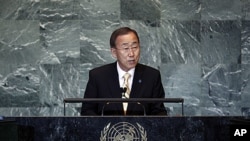The question of Palestinian statehood, sweeping changes in the Middle East, and the global economic crisis dominated Wednesday's opening session of the U.N. General Assembly’s annual debate.
U.N. Secretary-General Ban Ki-moon opened the 66th session of the General Assembly with his state of the world report. The news was not particularly good: there are nearly seven billion people on the planet vying for limited resources against a backdrop of climate change, armed conflict, natural disasters, and an economic crisis.
“These are extraordinary challenges. We cannot respond in ordinary ways. We need one thing above all else - solidarity,” he said.
Mr. Ban, who will begin his second and final five-year term in January, also spoke of the issue that has been overshadowing this week’s meeting, the Palestinian bid for full U.N. membership.
“We have long agreed that Palestinians deserve a state. Israel needs security. Both want peace. We pledge our unrelenting efforts to help achieve that peace through a negotiated settlement," Mr. Ban said.
On the pro-democracy movement sweeping through North Africa and the Middle East, Mr. Ban said it has been a source of inspiration. But he worried about six months of a government crackdown against protesters in Syria, saying the violence must stop and the moment for action is now.
President Nicolas Sarkozy of France put forth what he hopes can be a plan to break the stalemate on the Palestinian issue. He proposed non-member observer state status for the Palestinians in the General Assembly as an intermediate step, alongside a return to final status talks with Israel.
“Let us have one month to resume discussions, six months to find an agreement on borders and security, one year to reach a definitive agreement," Mr. Sarkozy said.
U.S. President Barack Obama, whose administration has said if necessary it would use its Security Council veto to keep the Palestinians from unilaterally seeking U.N. membership, said there is no short cut to peace, including U.N. resolutions.
Speaking on the Arab Spring and other dramatic events, Mr. Obama said it has been a remarkable year.
“The Gadhafi regime is over. Gbagbo, Ben Ali, Mubarak are no longer in power. Osama bin Laden is gone, and the idea that change could only come through violence has been buried with him. Something is happening in our world. The way things have been is not the way that they will be, Mr. Obama said.
And in a sign of positive change, the annual debate was opened for the first time by a female head of state - Brazilian President Dilma Rousseff. She promptly declared this the century of women. But she also echoed the concern of many other leaders, speaking of the economic crisis that is gripping much of the world.
Ms. Rousseff said the solution to the debt crisis must be combined with economic growth. She is heard here through a translator:
“It is also plain and clear that the priority of the world economy at this point in time, must be to solve the problems of countries facing a sovereign debt crisis and reversing the current recession scenario. The world’s most developed countries should put in place coordinated policies to stimulate the economies that have been extremely weakened by the crisis, emerging countries can help," Mr. Rousseff.
The Brazilian president called for among other things, reform of international financial institutions, fighting protectionism and trade manipulation, and ending exchange rate manipulations.
On the sidelines of the annual debate this week, leaders will also hold meetings on a number of other pressing topics, including the famine in the Horn of Africa, nuclear non-proliferation and combating terrorism.
News
Palestinians, Economic Crisis Dominate UNGA




